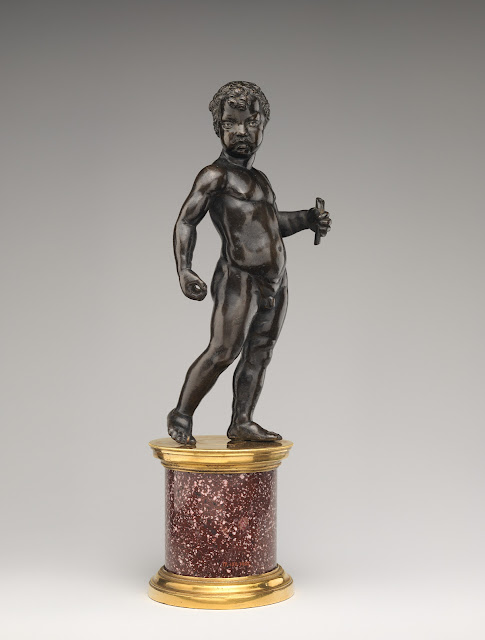 |
| attributed to Pastorino dei Pastorini Bust of Ottavio Farnese, Duke of Parma and Piacenza ca. 1547-52 bronze Metropolitan Museum of Art, New York |
 |
| Agostino Zoppo Allegorical Figure of Sibyl or Virtue ca. 1550 bronze statuette Metropolitan Museum of Art, New York |
 |
| Anonymous Italian sculptor working in Rome Reclining Female Figure (imitating Michelangelo) ca. 1550 bronze statuette Metropolitan Museum of Art, New York |
Sonnet 99
When far spent night persuades each mortal eye,
To whom nor art nor nature granteth light,
To lay his then mark-wanting shafts of sight,
Closed with their quivers, in sleep's armoury;
With windows ope then most my mind doth lie,
Viewing the shape of darkness and delight,
Takes in that sad hue, which with the inward night
Of his mazed powers keeps perfect harmony.
But when birds charm, and that sweet air, which is
Morn's messenger, with rose-enameled skies,
Calls each wight to salute the flower of bliss:
In tomb of lids then buried are mine eyes,
Forced by their lord, who is ashamed to find
Such light in sense, with such a darkened mind.
 |
| after Andrea Mantegna Standing Boy ca. 1450-75 bronze statuette Metropolitan Museum of Art, New York |
 |
| Anonymous Italian sculptor Bust of Marcus Aurelius ca. 1575-1600 bronze Metropolitan Museum of Art, New York |
 |
| after Benvenuto Cellini Jupiter ca. 1580 bronze statuette Metropolitan Museum of Art, New York |
 |
| Anonymous Italian sculptor working in Florence Portrait Medal of Giuliano de' Medici 1513 bronze Harvard Art Museums |
 |
| Anonymous Italian sculptor working in Florence Hercules and Antaeus ca. 1500-1525 bronze statuette Metropolitan Museum of Art, New York |
 |
| Severo da Ravenna The Spinario ca. 1496 bronze statuette Metropolitan Museum of Art, New York |
Sonnet 8
Love, born in Greece, of late fled from his native place,
Forced by a tedious proof that Turkish hardened heart
Is no fit mark to pierce with his fine pointed dart;
And, pleased with our soft peace, stayed here his flying race.
But, finding these north climes too coldly him embrace,
Not used to frozen clips, he strave to find some part
Where with most ease and warmth he might employ his art.
At length he perched himself in Stella's joyful face,
Whose fair skin, beamy eyes, like morning sun on snow,
Deceived the quaking boy, who thought, from so pure light
Effects of lively heat must needs in nature grow:
But she, most fair, most cold, made him thence take his flight
To my close heart; where, while some firebrands he did lay,
He burnt unwares his wings, and cannot fly away.
 |
| workshop of Severo da Ravenna Mercury ca. 1540 bronze statuette Metropolitan Museum of Art, New York |
 |
| workshop of Severo da Ravenna Atlantid ca. 1510 bronze statuette Metropolitan Museum of Art, New York |
 |
| Severo da Ravenna Neptune ca. 1500 bronze statuette Metropolitan Museum of Art, New York |
 |
| attributed to Severo da Ravenna Rearing Horse ca. 1500 bronze statuette Metropolitan Museum of Art, New York |
 |
| Severo da Ravenna Cleopatra ca. 1500-1525 bronze statuette Metropolitan Museum of Art, New York |
Sonnet 14
Alas, have I not pain enough, my friend,
Upon whose breast a fiercer gripe doth tire
Than did on him who first stole down the fire,
While Love on me doth all his quiver spend,
But with your rhubarb words you must contend
To grieve me worse, in saying that desire
Doth plunge my well-formed soul even in the mire
Of sinful thoughts, which do in ruin end?
If that be sin, which doth the manners frame,
Well stayed with truth in word, and faith of deed,
Ready of wit, and fearing nought but shame:
If that be sin which in fixed hearts doth breed
A loathing of all loose unchastity,
Then love is sin, and let me sinful be.
– the sonnets are from Astrophil and Stella by Sir Philip Sidney (1554-1586)